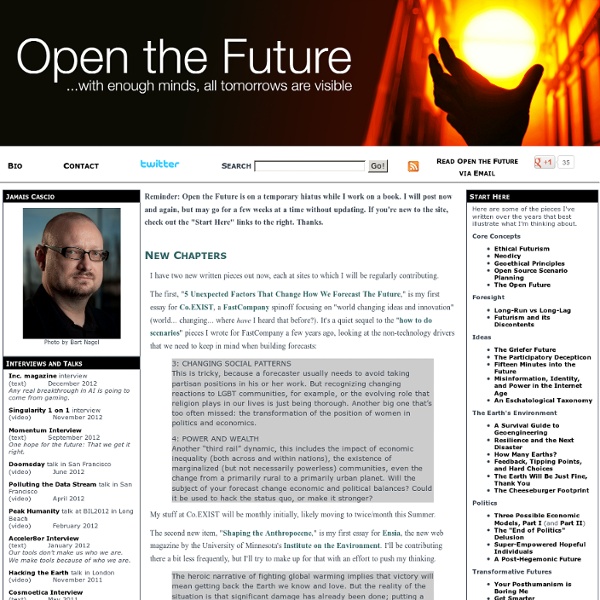



Matthias Horx This is intended as a short overview of our work and our personal ideas and beliefs about futurism and trend research. As well as an introduction what we think futurism is, there is a summary of main speech topics, interesting quotes, book tips and some examples of our company's published trend research in English. A live experiment with smart technologies. New energy concepts and family lifestyles of the 21st century. Grand opening: 2010. www.zukunftshaus.at World Design Cities Summit 23-24 February 2010 How will the cities of the future look? >> Read more (PDF-File, Korean language) If the browser does not display the content correctly, please use Adobe Reader to open the file. Throwing fear overboard. Matthias Horx sees the current economic crisis as a productive process for a necessary change in the economy, politics and society. Read more >>> Dec. 29th, 2009 deutschewelleenglisch Matthias Horx: "The Futurist's Paradox" Is it really good to know the future? Read the introduction and more --->
Open Culture Jamais Cascio Jamais Cascio is a San Francisco Bay Area-based writer and futurist specializing in design strategies and possible outcomes for future scenarios.[citation needed] Biography[edit] Jamais Cascio resides in the San Francisco Bay Area[1] Cascio received his undergraduate degree from UC Santa Cruz and later attended UC Berkeley. Online projects[edit] Worldchanging[edit] From 2003 to 2006 Cascio helped in the formation of Worldchanging. On November 29, 2010, Worldchanging announced that due to fundraising difficulties it would shut down.[5] It has since merged with Architecture for Humanity, though detailed plans for the site's future have not been released. Open the Future[edit] In early 2006, Cascio established Open The Future as his online home, a title based on his WorldChanging essay, The Open Future. Public speaking and research affiliations[edit] Cascio currently serves as Director of Impacts Analysis for the Center for Responsible Nanotechnology.[6] Books[edit] Press[edit] Awards[edit]
Mike Walsh Students for Free Culture The Future of Money: It’s Flexible, Frictionless and (Almost) Fr Cash in the clouds—neither paper nor plastic.Illustration: Aegir Hallmundur; Benjamin Franklin: Corbis A simple typo gave Michael Ivey the idea for his company. One day in the fall of 2008, Ivey’s wife, using her pink RAZR phone, sent him a note via Twitter. But instead of typing the letter d at the beginning of the tweet — which would have sent the note as a direct message, a private note just for Ivey — she hit p. It could have been an embarrassing snafu, but instead it sparked a brainstorm. Money Over Time A brief history of currency technology. —Bryan Gardiner 9000 BC: Cows The rise of agriculture made commodities like cattle and grain ideal proto-currencies: Since everyone knew what a heifer or a bushel was worth, the system was more efficient than barter. Just a decade ago, the idea of moving money that quickly and cheaply would have been ridiculous. Ivey got around that problem by using PayPal. But perhaps nobody is as ambitious as PayPal.
Gerd Leonhard (MediaFuturist) MIT World | Distributed Intelligence De la biologie comme science historique Glen Hiemstra (Futurist.com) OpenEdition : portail de ressources électroniques en sciences humaines et sociales